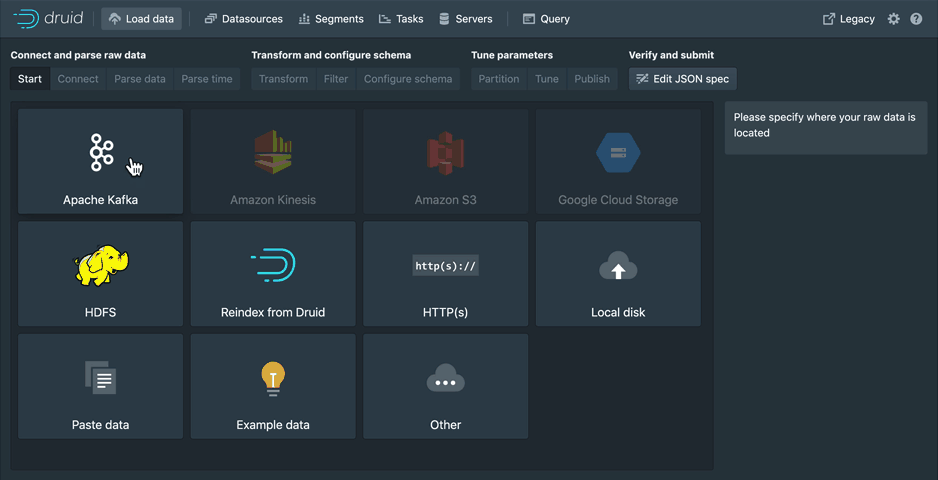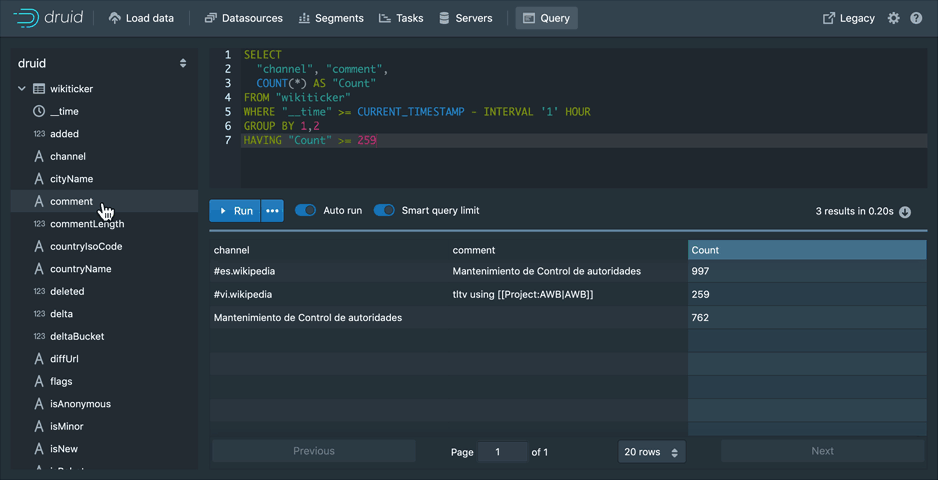This PR creates an interface for ImmutableRTree and moved the existing implementation to new class which represent 32 bit implementation (stores coordinate as floats). This PR makes the ImmutableRTree extendable to create higher precision implementation as well (64 bit). In all spatial bound filters, we accept float as input which might not be accurate in the case of high precision implementation of ImmutableRTree. This PR changed the bound filters to accepts the query bounds as double instead of float and it is backward compatible change as it compares double to existing float values in RTree. Previously it was comparing input float to RTree floats which can cause precision loss, now it is little better as it compares double to float which is still not 100% accurate. There are no changes in the way that we query spatial dimension today except input bound parsing. There is little improvement in string filter predicate which now parse double strings instead of float and compares double to double which is 100% accurate but string predicate is only called when we dont have spatial index. With allowing the interface to extend ImmutableRTree, we allow to create high precision (HP) implementation and defines new search strategies to perform HP search Iterable<ImmutableBitmap> search(ImmutableDoubleNode node, Bound bound); With possible HP implementations, Radius bound filter can not really focus on accuracy, it is calculating Euclidean distance in comparing. As EARTH 🌍 is round and not flat, Euclidean distances are not accurate in geo system. This PR adds new param called 'radiusUnit' which allows you to specify units like meters, km, miles etc. It uses https://en.wikipedia.org/wiki/Haversine_formula to check if given geo point falls inside circle or not. Added a test that generates set of points inside and outside in RadiusBoundTest. |
||
|---|---|---|
| .github | ||
| .idea | ||
| benchmarks | ||
| cloud | ||
| codestyle | ||
| dev | ||
| distribution | ||
| docs | ||
| examples | ||
| extensions-contrib | ||
| extensions-core | ||
| hooks | ||
| indexing-hadoop | ||
| indexing-service | ||
| integration-tests | ||
| integration-tests-ex | ||
| licenses | ||
| processing | ||
| publications | ||
| server | ||
| services | ||
| sql | ||
| web-console | ||
| website | ||
| .asf.yaml | ||
| .backportrc.json | ||
| .codecov.yml | ||
| .dockerignore | ||
| .gitignore | ||
| .lgtm.yml | ||
| CONTRIBUTING.md | ||
| LABELS | ||
| LICENSE | ||
| NOTICE | ||
| README.md | ||
| README.template | ||
| check_test_suite.py | ||
| check_test_suite_test.py | ||
| doap_Druid.rdf | ||
| it.sh | ||
| licenses.yaml | ||
| owasp-dependency-check-suppressions.xml | ||
| pom.xml | ||
| rewrite.yml | ||
| upload.sh | ||
README.md
Apache Druid
Druid is a high performance real-time analytics database. Druid's main value add is to reduce time to insight and action.
Druid is designed for workflows where fast queries and ingest really matter. Druid excels at powering UIs, running operational (ad-hoc) queries, or handling high concurrency. Consider Druid as an open source alternative to data warehouses for a variety of use cases. The design documentation explains the key concepts.
Getting started
You can get started with Druid with our local or Docker quickstart.
Druid provides a rich set of APIs (via HTTP and JDBC) for loading, managing, and querying your data. You can also interact with Druid via the built-in web console (shown below).
Load data
Load streaming and batch data using a point-and-click wizard to guide you through ingestion setup. Monitor one off tasks and ingestion supervisors.
Manage the cluster
Manage your cluster with ease. Get a view of your datasources, segments, ingestion tasks, and services from one convenient location. All powered by SQL systems tables, allowing you to see the underlying query for each view.
Issue queries
Use the built-in query workbench to prototype DruidSQL and native queries or connect one of the many tools that help you make the most out of Druid.
Documentation
See the latest documentation for the documentation for the current official release. If you need information on a previous release, you can browse previous releases documentation.
Make documentation and tutorials updates in /docs using Markdown or extended Markdown (MDX). Then, open a pull request.
To build the site locally, you need Node 16.14 or higher and to install Docusaurus 2 with npm|yarn install in the website directory. Then you can run npm|yarn start to launch a local build of the docs.
If you're looking to update non-doc pages like Use Cases, those files are in the druid-website-src repo.
Community
Visit the official project community page to read about getting involved in contributing to Apache Druid, and how we help one another use and operate Druid.
- Druid users can find help in the
druid-usermailing list on Google Groups, and have more technical conversations in#troubleshootingon Slack. - Druid development discussions take place in the
druid-devmailing list (dev@druid.apache.org). Subscribe by emailing dev-subscribe@druid.apache.org. For live conversations, join the#devchannel on Slack.
Check out the official community page for details of how to join the community Slack channels.
Find articles written by community members and a calendar of upcoming events on the project site - contribute your own events and articles by submitting a PR in the apache/druid-website-src repository.
Building from source
Please note that JDK 8 or JDK 11 is required to build Druid.
See the latest build guide for instructions on building Apache Druid from source.
Contributing
Please follow the community guidelines for contributing.
For instructions on setting up IntelliJ dev/intellij-setup.md


























